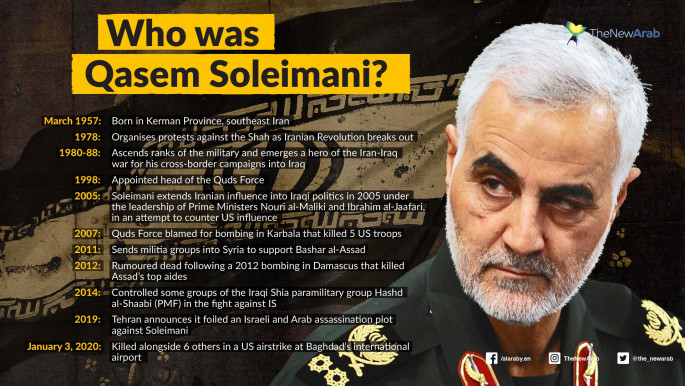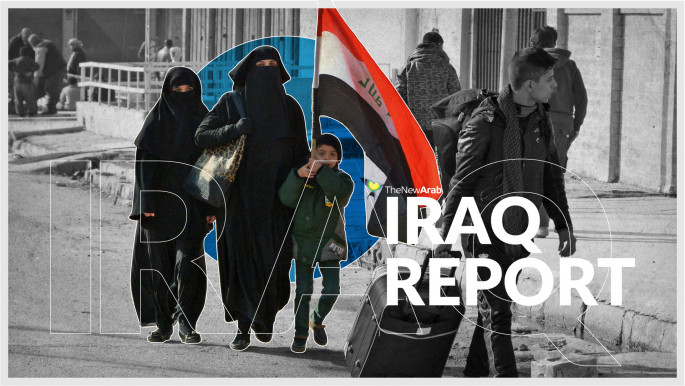The Iraq Report: Iran's power in Iraq now questioned after US kills Soleimani
In absolutely seismic news, top Iranian Islamic Revolutionary Guard Corps [IRGC] commander, Major General Qassem Soleimani, was killed in an overnight US drone strike in Baghdad.
The deadly attack follows swiftly on the heels of pro-Iran militants besieging the US embassy in Baghdad earlier this week. According to the Pentagon, the American attack was conducted on the orders of President Donald Trump in a "defensive" move meant to deter Iran from further anti-US actions.
Soleimani's death will have major implications for the Middle East. His presence in many Middle Eastern conflicts, from Iraq, to Syria, to Lebanon, and even Yemen, was felt ubiquitously.
He was the man behind Iran's imperial adventures in the region and the second most powerful man in Tehran after Supreme Leader Ali Khamenei himself. Iran will now be forced to retaliate or else risk looking weak among its own proxies as well as its rivals and adversaries in the region.
Soleimani's death a game changer
While the Pentagon this morning announced that the strike that took out Qassem Soleimani and several of his top IRGC aides was a "decisive defensive action", it would appear that it was instead a retaliation to the Iran-orchestrated siege of the US embassy in Baghdad earlier this week.
 |
In the aftermath of the crisis at the embassy, experts argued that it demonstrated how the United States has no friends in Iraq while Iran held all the cards in terms of influence. The attack on the US embassy showed that the US could be humiliated and the Iraqi establishment would simply stand aside and let it happen if Tehran gave them the word.
In other words, it was not enough for the White House to simply prevent a recurrence of the 2012 Benghazi attacks in Libya that led to the deaths of several Americans, including Ambassador John Stevens. To maintain deterrence and to not show weakness to other major rivals including Russia and China, the United States needed to take decisive action.
Read more: Iran vows 'severe revenge' after US kills powerful commander Qasem Soleimani
Soleimani was said to have arrived at Baghdad International Airport last night with an entourage of IRGC officers and high-ranking proxies, including Lebanese Hezbollah's Mohammed al-Kawtharani, the Shia militant group's top man in Iraq.
Soleimani was received in the airport by the Iraqi Popular Mobilisation Forces [PMF] second-in-command, Abu Mahdi al-Muhandis, who is also the leader of the Kataib Hezbollah militia. The entourage boarded two vehicles just after several Soviet-era Katyusha rockets commonly used by pro-Iran groups reportedly hit US-led anti-Islamic State coalition facilities in the airport's vicinity.
What happened next was nothing short of devastating as an American drone proceeded to light up the highway leading from the airport and destroy the entire convoy, killing everyone inside including Soleimani and Muhandis, sending shockwaves throughout the Middle East.
 |
Soleimani was the main man behind Iran's meteoric imperial rise to dominance in the region |  |
Soleimani was the main man behind Iran's meteoric imperial rise to dominance in the region. It was Soleimani and his elite IRGC Quds Force who set up dozens of extremist Shia militia groups in Iraq and Syria, and lent significant expertise and support to Yemen's Houthis to destabilise and bleed rival Saudi Arabia. It was also Soleimani who orchestrated the Lebanese Hezbollah's control over Lebanon's politics.
His loss is a grievous blow to the Iranian regime, and their power and hold over Iraq, while still unquestionably formidable, is now no longer a given. While Khamenei held the ultimate power in Iran and leads the state, the main strategic impetus behind Tehran's regional gains was undoubtedly Soleimani and he will not be easily replaced.
In fact, his replacement Brigadier General Ismail Ghani will have a monumental task before him as he does not command the same combination of fear, charisma, admiration, and respect that his predecessor did. Also, as head of a US designated terrorist organisation, he now has a larger target painted on his back. Considering what just happened to Soleimani, widely considered the most powerful man in the Middle East, that is an uncomfortable proposition for anyone.
Iran's proxies may now move cautiously in Iraq
Importantly, however, the effect on domestic Iraqi actors beholden to Iranian designs should not be understated. After all, as mastermind and a man who led these proxies primarily on the basis of ideology, the loss of Soleimani and senior militants such as Abu Mahdi al-Muhandis will have the remaining militias pondering their own fates while simultaneously plotting how to strike back.
Twitter Post
|
In the immediate aftermath of the attacks, Shia cleric Muqtada al-Sadr declared that he would be reactivating his long-dormant Mahdi Army militia. This is the same militia that ran amok during the Iraqi civil war and was a major death squad perpetrating a plethora of sectarian murders and abuses against Iraqi Sunnis, particularly in Basra and Baghdad.
Sadr has spent years trying to distance himself from the Mahdi Army's more grotesque actions, rebranding his militia several times with the latest incarnation being Saraya al-Salam.
Sadr has also tried to position himself as an Iraqi nationalist, though this has backfired in recent months as he was photographed paying homage to Supreme Leader Khamenei. It is noteworthy that Sadr was supported extensively by the IRGC, particularly at the height of the Mahdi Army's power, and so his attempts to polish his image have consistently run into trouble.
Aside from Sadr, Qais al-Khazali has today declared that his Asaib Ahl ul-Haq [AAH] militia will "prepare for battle" and has sworn to expel American forces from Iraq to avenge the loss of Soleimani and Abu Mahdi al-Muhandis.
AAH have repeatedly been in news headlines in recent years, particularly during the war against Islamic State militants, due to their sectarian atrocities perpetrated against Sunni Arabs. They have been repeatedly called out for "war crimes" by international human rights organisations, including Amnesty International.
Read more: US killing of top Iran general Soleimani sparks global fears
While caretaker Prime Minister Adel Abdul Mahdi has himself issued statements of condemnation stating the US attack risks "sparking a devastating war" that will likely be fought on Iraqi territory, it is unlikely the Iranians will respond conventionally.
Instead, it will have to rely on its already extant strategy of low-intensity conflict by proxy which risks a bloodbath in Iraq as these virulently sectarian Shia militias ramp up their persecution of minorities and attack even their coreligionists who disagree with Iran's influence being a deciding factor in Iraq's decision-making, as demonstrated by their violence towards mostly Shia Arab protesters.
Iran's options for retaliation
It will be nigh on impossible for the Iranian regime to respond to the slaying of Qassem Soleimani in a tit-for-tat manner, and therefore Tehran has limited options in how it can respond. However, respond and retaliate it must if it wants to maintain its grip on power.
Twitter Post
|
To that end, it is highly likely that Iran will engage in a strategy of reasserting its dominance in countries where it has strong influence. It will also seek to revitalise its image of "resistance" to the "Great Satan" of the United States and also to Israel.
It is therefore expected that the Lebanese Hezbollah will begin agitating on Israel's borders to provoke a conflict and to claim some sort of victory simply by surviving a devastating Israeli air onslaught that will likely claim the lives of countless Lebanese civilians stuck in the middle.
Tehran will also want to assert its dominance in foreign capitals, sending a message that the United States may be able to hurt them, but everyone else is lower down the food chain.
This will therefore mean an even bloodier approach to the already violent methods used to crush the protest movement in Iraq that calls for the reform of the political system and the expulsion of Iran. This may also be replicated to a lesser degree in Beirut where there is still significant anti-Iranian unrest.
Read more: A history of US-Iraq relations since the 2003 war
The IRGC will not want to be seen to sit on its hands either, and will activate its significant proxies in Iraq to resume attacks on US bases, although it is certain that they will want to perhaps temper their attacks to make a show of force without compelling a devastating American response.
What is certain is that Iran will not respond conventionally. Iran's conventional forces have played second fiddle to its reliance on the asymmetric methods employed by the IRGC for decades and therefore they have suffered in terms of investment and combat readiness. They simply cannot go toe-to-toe with the United States without suffering a humiliating and decisive defeat.
Should Iran's response to the assassination of Soleimani not live up to expectations, however, some of its proxies may decide that they are better off charting their own course. This will lead to the fragmentation of Iranian power not only in Iraq but across the region, bringing an end to its relatively short-lived imperial ambitions.
Follow us on Twitter and Instagram to stay connected
The Iraq Report is a fortnightly feature at The New Arab.
Click below to see the full archive.




